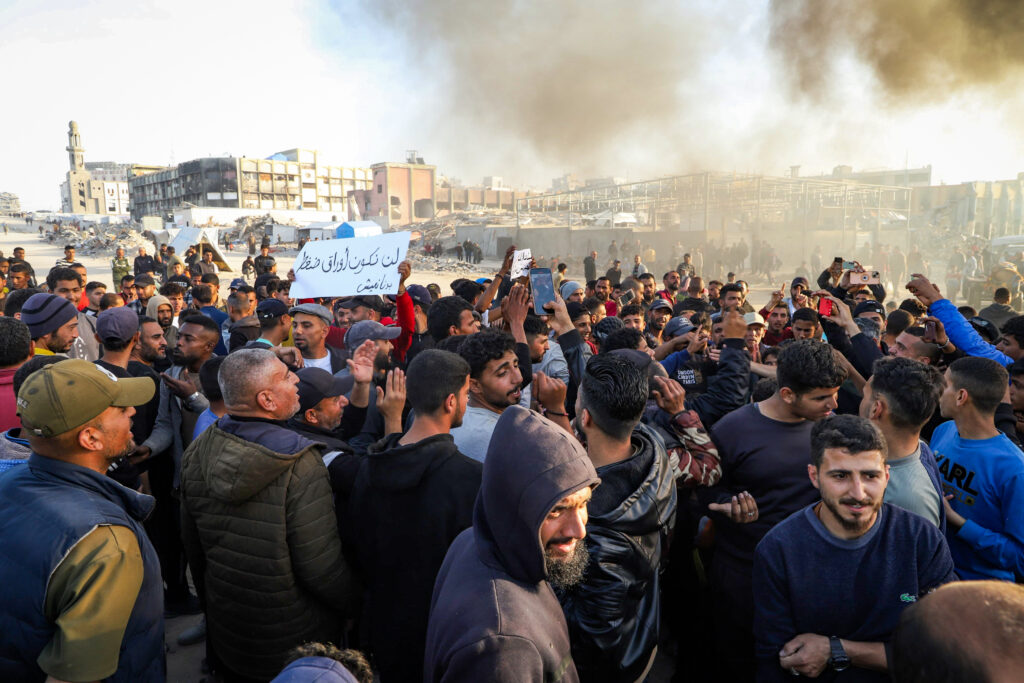They’re finally fed up.
Standing amid the ruins of what was once their neighborhood, dozens of Gazans did the unthinkable last week – they openly called for Hamas’s removal. The videos spread like wildfire: ordinary Palestinians, their faces etched with exhaustion and rage, finally breaking their silence against the terrorist organization that has ruled them with an iron fist.
This isn’t happening in some NGO fantasy or UN conference room. It’s happening on the streets of Gaza, where merely criticizing Hamas has typically meant imprisonment or worse.
For months, Western media and international organizations have peddled the narrative that Hamas doesn’t represent the people of Gaza. Yet until recently, all evidence pointed to the contrary.
The facts speak for themselves: When Jewish hostages were paraded through Gaza’s streets on October 7th, cheering crowds lined those same streets. The support for Hamas was unmistakable and undeniable.
But something remarkable is happening. Across Gaza, Palestinians are standing up against Hamas. Mass demonstrations have erupted with civilians openly calling for Hamas’s removal. They’ve witnessed firsthand the catastrophic consequences of Hamas’s rule and its war against Israel.
Make no mistake – these protesters haven’t suddenly embraced Zionism. What they have embraced is reality. The destruction and devastation brought upon Gaza is the direct result of Hamas’s actions and ideology. The people of Gaza are finally connecting these dots.
Simultaneously, Lebanon is experiencing its own awakening. For years, Hezbollah has operated as a state within a state, wielding more power than Lebanon’s own army. Now, with new leadership taking control, we’re seeing unprecedented pushback. There’s even a public campaign urging Lebanon’s new banking chief to outlaw Hezbollah’s financial institutions – effectively cutting off the terror group’s economic lifeline.
This represents a seismic shift in regional dynamics. Both Gazans and Lebanese citizens are rejecting the terrorist organizations that have hijacked their societies and dragged them into destructive conflicts with Israel.

The strategic implications are profound. When populations realize that supporting groups dedicated to Israel’s destruction brings only ruin upon themselves, we may finally see sustainable quiet on our borders. Any organization attempting to launch rockets or wage war against Israel might face immediate rejection from the very people they claim to represent.
This doesn’t mean peace treaties are imminent. But it does suggest a new pragmatism is emerging – one based on self-preservation rather than ideology. The people of Gaza and Lebanon are exhausted by the cycle of violence and the devastating Israeli response that inevitably follows terrorist aggression.
For Israel, this presents both an opportunity and a challenge. We must remain vigilant in our security operations while recognizing and potentially nurturing these shifts in public sentiment.
History has taught us to be cautious about Middle Eastern optimism. But for the first time in a long while, we’re seeing cracks in the foundation of terrorist control in neighboring territories.
The crowds we now see protesting against Hamas represent the first genuine counter-voice in Gaza. They’re not doing it for Israel – they’re doing it for themselves. And that’s precisely why it matters.





